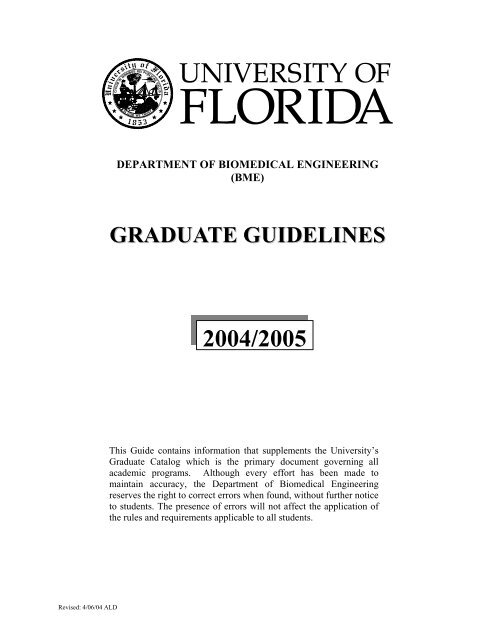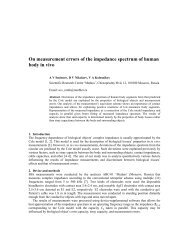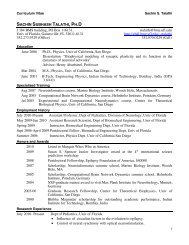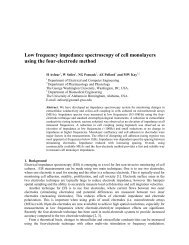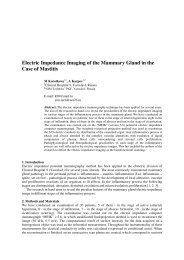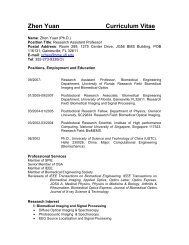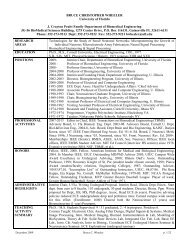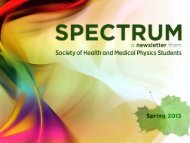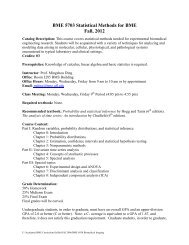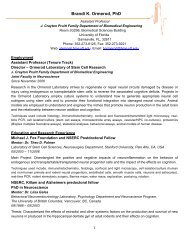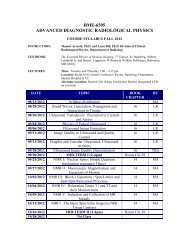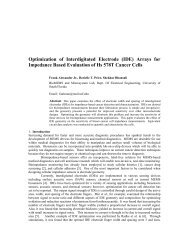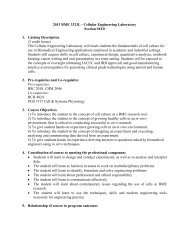graduate guidelines - Biomedical Engineering - University of Florida
graduate guidelines - Biomedical Engineering - University of Florida
graduate guidelines - Biomedical Engineering - University of Florida
You also want an ePaper? Increase the reach of your titles
YUMPU automatically turns print PDFs into web optimized ePapers that Google loves.
DEPARTMENT OF BIOMEDICAL ENGINEERING(BME)GRADUATE GUIDELINES2004/2005This Guide contains information that supplements the <strong>University</strong>’sGraduate Catalog which is the primary document governing allacademic programs. Although every effort has been made tomaintain accuracy, the Department <strong>of</strong> <strong>Biomedical</strong> <strong>Engineering</strong>reserves the right to correct errors when found, without further noticeto students. The presence <strong>of</strong> errors will not affect the application <strong>of</strong>the rules and requirements applicable to all students.Revised: 4/06/04 ALD
GRADUATE GUIDELINESDepartment <strong>of</strong> <strong>Biomedical</strong> <strong>Engineering</strong><strong>University</strong> <strong>of</strong> <strong>Florida</strong>Gainesville, <strong>Florida</strong> 32611Department AdministrationDr. William DittoChairDr. Anthony BrennanGraduate CoordinatorLaura StudstillOffice ManagerFor Information:April DerfinyakProgram AssistantDepartment <strong>of</strong> BME<strong>University</strong> <strong>of</strong> <strong>Florida</strong>130 BME BuildingPO Box 116131Gainesville, FL 32611-6131Tel: (352) 846-1851Fax: (352) 392-979Email: assistant@bme.ufl.eduRevised: 4/06/04 ALD 2
TABLE OF CONTENTSGRADUATE GUIDELINES................................................................................................. 1TABLE OF CONTENTS................................................................................................................ 3OBJECTIVES AND ....................................................................................................................... 4OVERVIEW OF THE DEPARTMENT ........................................................................................ 4GRADUATE FACULTY AFFILIATES........................................................................................ 5ADMISSION TO THE DEPARTMENT OF BME ...................................................................... 5Introduction................................................................................................................................. 5Admission Procedures ................................................................................................................ 5Admission Checklist ................................................................................................................... 5REQUIREMENTS FOR DEGREES.............................................................................................. 6MASTER’S DEGREE.................................................................................................................... 7Admission Requirements............................................................................................................ 7Appointment <strong>of</strong> Supervisory Committee.................................................................................... 7Master’s Degree-Thesis Option ...................................................................................................... 8Checklist for THESIS Master’s Degrees ........................................................................................ 9MS in BIOMEDICAL ENGINEERING - THESIS OPTION (30) .............................................. 10Master’s Degree Non-Thesis Option ............................................................................................ 10MS in BIOMEDICAL ENGINEERING - NON THESIS OPTION (32)..................................... 12DOCTOR OF PHILOSOPHY DEGREE ..................................................................................... 14PhD Final Examination................................................................................................................. 17Submission <strong>of</strong> Doctoral Dissertation ............................................................................................ 17Checklist for PhD Degree ............................................................................................................. 18PhD in BIOMEDICAL ENGINEERING ..................................................................................... 19Administrative Procedures……………………………………………………………………….21BME COURSES AND ELECTIVES........................................................................................... 24Program Core Courses .................................................................................................................. 23BME Electives .............................................................................................................................. 23BME Research .............................................................................................................................. 24Area <strong>of</strong> Specialization Requirements............................................................................................ 24TISSUE ENGINEERING……………………………………………………………………..25BIOMECHANICS…………………………………………………………………………….26BIOMEDICAL IMAGING & SIGNAL PROCESSING ......................................................... 26Mathematics Electives .................................................................................................................. 28Medical Sciences Electives........................................................................................................... 30Program <strong>of</strong> Study Worksheet........................................................................................................ 30MS Degree (Thesis)................................................................................................................. 30Program <strong>of</strong> Study Worksheet…………………………………………………………………….35MS Degree (Non-Thesis) ....................................................................................................... 37Program <strong>of</strong> Study Worksheet........................................................................................................ 37PhD Degree................................................................................................................................ 39Revised: 4/06/04 ALD 3
OBJECTIVES ANDOVERVIEW OF THE PROGRAMThe mission <strong>of</strong> the Department <strong>of</strong> <strong>Biomedical</strong> <strong>Engineering</strong> (BME) is to educate students with strongengineering and science backgrounds for Master’s and/or PhD degrees in <strong>Biomedical</strong> <strong>Engineering</strong> so thatthey can productively apply their training to the solution <strong>of</strong> engineering problems in the fields <strong>of</strong>medicine, biology and related fields.<strong>Biomedical</strong> <strong>Engineering</strong> Objectives1. Provide students with a broad knowledge base <strong>of</strong> biomedical engineering and specialized knowledgeand experience in at least one <strong>of</strong> the core areas: Biomechanics, Tissue <strong>Engineering</strong>, <strong>Biomedical</strong> Imagingand Signal Processing, Cardiac <strong>Engineering</strong>, Neural <strong>Engineering</strong>, BioMicro-Electromechanical Systems.2. Provide students with the ability to apply fundamental engineering principles from several traditionalengineering disciplines to identify, analyze and solve clinical problems and improve health care.3. Provide students with the ability to design and conduct scientific and engineering experiments, and toanalyze and interpret the resulting data.4. Provide students with experience and understanding <strong>of</strong> design requirements and constraints in theclinical and biological science environment, including technology transfer.5. Provide students with the skills needed to communicate effectively, work collaboratively, andunderstand their pr<strong>of</strong>essional and ethical responsibilities and the impact <strong>of</strong> clinically significantengineering solutions in a societal and economic context.The Department <strong>of</strong> BME is interdisciplinary and collaborative, with designated departments in theCollege <strong>of</strong> <strong>Engineering</strong> (COE) and College <strong>of</strong> Medicine (COM) acting as partners in the education <strong>of</strong><strong>Biomedical</strong> Engineers. COE participating departments include: Mechanics & <strong>Engineering</strong> Science(AeMES), Chemical <strong>Engineering</strong> (CHE), Computer & Information Science & <strong>Engineering</strong> (CISE),Electrical & Computer <strong>Engineering</strong> (ECE), Materials Science & <strong>Engineering</strong> (MSE), Mechanical &Aerospace <strong>Engineering</strong> (MAE), and Nuclear & Radiological <strong>Engineering</strong> (NRE). The participatingdepartment within the COM includes Surgery, Anesthesiology, Radiology, and Cardiology.<strong>Biomedical</strong> <strong>Engineering</strong> students are admitted to the Graduate School through the Department <strong>of</strong> BME.The BME Academic Committee reviews and makes all decisions regarding admission to the Department<strong>of</strong> BME. Each student’s research advisor must hold a Faculty appointment in the Department <strong>of</strong> BME.Supervisory committees for BME students normally include at least one member <strong>of</strong> the Faculty from theCollege <strong>of</strong> <strong>Engineering</strong> and one member <strong>of</strong> the Faculty from the College <strong>of</strong> Medicine.Revised: 4/06/04 ALD 4
GRADUATE FACULTYDepartment Chair: W.L. Ditto. Pr<strong>of</strong>essors: C.D. Batich, W.E. Bolch, F. Bova, A.B. Brennan, M. Ding,J.R. Fitzsimmons, E.P. Goldberg, H. Jiang, J.J. Mecholsky, R.J. Melker, P.M. Pardalos, W.M. Phillips,J.C. Principe, J.C. Sackellares, R. Tran-Son-Tay, B.C. Vemuri, E.K. Walsh. Associate Pr<strong>of</strong>essors: R.Dickinson, D.R. Gilland, L.B. Gower, J.G. Harris, D.E. Hintenlang, T.H.,Mareci. Assistant Pr<strong>of</strong>essors:T.B. DeMarse, B.J. Fregly, A. Narang, J.H. van Oostrom.ADMISSION TO THE DEPARTMENT OF BMEIntroductionThe Department <strong>of</strong> <strong>Biomedical</strong> <strong>Engineering</strong>(BME) at the <strong>University</strong> <strong>of</strong> <strong>Florida</strong> <strong>of</strong>fers theMaster <strong>of</strong> <strong>Engineering</strong> (ME) and Master <strong>of</strong>Science (MS), as well as the Doctorate <strong>of</strong>Philosophy (PhD) degrees in <strong>Biomedical</strong><strong>Engineering</strong>. The Graduate Guidelines detail thepolicies and regulations governing theseprograms and should be used in conjunctionwith the <strong>University</strong> <strong>of</strong> <strong>Florida</strong> Graduate Catalog.It is the responsibility <strong>of</strong> the student to befamiliar with both publications and to adhere tothe stated rules.Admission ProceduresAdmission forms and procedures can beobtained from the Department <strong>of</strong> BME ordirectly from the web at www.bme.ufl.edu.Prospective students are urged to apply foradmission as early as possible. Completedapplications are reviewed by the BMEAcademic Committee for admission.Admission Checklist Complete the application and returnit with a $30 check or money orderto the Office <strong>of</strong> the Registrar. Makecheck payable to the <strong>University</strong> <strong>of</strong><strong>Florida</strong>. No application will beprocessed without payment <strong>of</strong> the$30 application fee. Take the Graduate RecordExamination (GRE) and indicate thatthe results are to be sent to the<strong>University</strong> <strong>of</strong> <strong>Florida</strong> Office <strong>of</strong> theRegistrar via ETS. Where applicable,also have TOEFL scores forwardedto the Office <strong>of</strong> the Registrar viaETS. Obtain all application materials fromwww.bme.ufl.edu. Send copy <strong>of</strong> completed application,transcripts (<strong>graduate</strong> andunder<strong>graduate</strong>), area <strong>of</strong> study form, 3letters <strong>of</strong> recommendation, and yourstatement <strong>of</strong> purpose to theDepartment <strong>of</strong> <strong>Biomedical</strong><strong>Engineering</strong>.Revised: 4/06/04 ALD 5
REQUIREMENTS FOR DEGREESFor the Master’s degree a minimum <strong>of</strong> 30 thesis or non-thesis semester hours is required. ThePhD degree requires the accumulation <strong>of</strong> at least 90 semester credit hours beyond the Bachelor’s degree.No more than 30 hours <strong>of</strong> a Master’s degree from another institution will be transferred to the PhDdegree. If a student holds a Master’s degree in a discipline different from the doctoral program, theMaster’s work will not be counted toward the PhD degree unless the Department <strong>of</strong> BME petitions theDean <strong>of</strong> the Graduate School. All courses beyond the Master’s degree taken at another university, to beapplied to the PhD degree, must be taken at an institution <strong>of</strong>fering the doctoral degree and must beapproved for <strong>graduate</strong> credit by Graduate School <strong>of</strong> the <strong>University</strong> <strong>of</strong> <strong>Florida</strong>.To <strong>graduate</strong> from any <strong>of</strong> the above-mentioned degree programs, a cumulative GPA <strong>of</strong> at least 3.0is required.Normally, no <strong>graduate</strong> credit is allowed for BME courses below the 5000 level. However,<strong>graduate</strong> credit can be received for 3000 and 4000 level technical courses taken, provided the courses areapproved by the student’s committee. No 1000 or 2000 level courses may be taken for <strong>graduate</strong> credit.A summary <strong>of</strong> the pertinent degree requirements is shown in the table. The BME specialty areasare: Biomechanics, Cell & Tissue <strong>Engineering</strong>, <strong>Biomedical</strong> Imaging and Processing, Cardiac<strong>Engineering</strong>, Neural <strong>Engineering</strong>, and BioMicro-Electromechanical Systems. For detailed requirementssee the appropriate sections that follow.Semester Credit HourMaster Master Doctor <strong>of</strong> PhilosophyRequirements (minimum number) (Thesis) (Non-thesis)Total Semester Credit hours 30 a 30 a 90 a,bBME Core Requirements 14 14 22<strong>Engineering</strong> Specialty Elective 3 3 3BME <strong>Engineering</strong> Elective 9 9 15Supervisory committee members(minimum number)3 1 c 4Qualifying Exam None None yes dFinal Exam Oral e Written f Oral gTime limit for completing degree 7 years 7 years 5 years ha. Beyond BSb. May include 30 hours from Master’s programc. Recommend at least 2d. Two-part exam. Written part within four semesters after entry, not counting the summer semestere. On Thesis and course workf. Exam content determined by the student’s supervisory committeeg. On Dissertation and course workh. 5 years from admission to candidacy.Revised: 4/06/04 ALD 6
MASTER’S DEGREEThe Department <strong>of</strong> BME <strong>of</strong>fers both thesis and non-thesis options for the Master’s degree. A studentseeking the Master’s degree with a thesis option is required to pass an oral final exam, and the non-thesisMaster’s student is required to pass a written comprehensive examination.The Master <strong>of</strong> <strong>Engineering</strong> (ME) degree is awarded to only those students with an ABET accredited BSin engineering, and the Master <strong>of</strong> Science (MS) degree to those students with an under<strong>graduate</strong> degree inany appropriate area.All work counted for the Master’s degree must be completed during the seven years immediatelypreceding the date on which the degree is to be awarded.Admission RequirementsThe students admitted to the Department <strong>of</strong>BME for the Master’s degree will in general beexpected to have an under<strong>graduate</strong> upperdivision grade point average <strong>of</strong> at least 3.4 on a4.0 scale, a GRE verbal plus quantitative score<strong>of</strong> at least 1200, where applicable, a TOEFLscore <strong>of</strong> no less than 550 for the paper based and213 for the computer based test. Three letters <strong>of</strong>recommendation are also required.If a student needs to have any courses that arenot considered Graduate Level, i.e., below 4000level the Graduate Coordinator should make anyapprovals before the student registers for thecourse. It is crucial that each and every BMEstudent has an overall comprehensiveunderstanding <strong>of</strong> the curriculum and be able tomaster it well. If a student lacks in a particulararea the Graduate Coordinator should overseethis and be able to suggest courses to enhancethis student(s) education to the benefit <strong>of</strong> thatstudent and his/her matriculation and experiencethrough the Graduate Degree Program in BME.Appointment <strong>of</strong> SupervisoryCommitteeThe supervisory committee should be appointedas soon as possible but no later that the secondsemester. Their duties are to advise the student,to check on the student’s qualifications &progress, to supervise the preparation <strong>of</strong> thethesis, and to conduct the final exam. Thestudent is responsible for forming a SupervisoryCommittee and providing the name <strong>of</strong> thecommittee members to the <strong>Biomedical</strong><strong>Engineering</strong> Graduate Department Office. Thefunction <strong>of</strong> the committee is to guide the studentthrough his/her thesis research and to administerthe final examination.The supervisory committee for a master’s degreewith a thesis must consist <strong>of</strong> at least threemembers selected from the Graduate Faculty. Atleast two members must hold an academicappointment in the Department <strong>of</strong> BME. Thechairperson must be affiliated with theDepartment <strong>of</strong> BME. The chairperson is thestudent’s academic advisor and should advisethe student in the selection <strong>of</strong> other members.The supervisory committee for a master’s degreewithout a thesis may consist <strong>of</strong> two members <strong>of</strong>the BME <strong>graduate</strong> faculty. The chairperson mustbe affiliated with the Department <strong>of</strong> BME and isthe one who advises the student and oversees theprogram The other member(s) will be designatedby the BME Supervisory Committee Chair.Revised: 4/06/04 ALD 7
Master’s Degree-Thesis OptionCourse RequirementsFor the thesis option Master’s degree the student must complete at least 30 semestercredit hours, which may include up to six semester hours <strong>of</strong> BME 6971 (Research forMaster’s Thesis). Thesis students must be registered for three credits <strong>of</strong> thesis research(BME 6971) in the term <strong>of</strong> graduation.Up to twelve hours <strong>of</strong> BME 6938 (Special Topics) may be applied toward the degreewith approval from the supervisory committee. Up to six hours <strong>of</strong> Individual Work (BME6905) may be applied toward the degree with approval from the supervisory committee.A course with a final grade <strong>of</strong> C and above cannot be repeated for credit. In case astudent receives a grade lower than a C for a course, he/she may retake the course and anaverage GPA <strong>of</strong> both grades for the course will be used for compiling GPA graduationrequirements. Only course with grades <strong>of</strong> C or higher may be used to fulfill the credit hourrequirement for the degree.Master’s Thesis Final Examination ProceduresWithin six months prior to graduation, the supervisory committee will give the studentan oral examination on the thesis, major and minor subjects, and matters pertaining tohis/her field <strong>of</strong> study.Each student is responsible for applying for his/her degree the semester <strong>of</strong> graduation.The “Application for Degree” form is available from the Registrar’s Office and studentswho fail to apply before the specified deadline will not receive their degree in thatsemester. The student must let the Department <strong>of</strong> BME know <strong>of</strong> their graduation intentionsthe semester prior <strong>of</strong> graduation. This will allow time for course requirement checks.It is imperative that copies <strong>of</strong> the student’s thesis be given to the supervisorycommittee at least one week in advance <strong>of</strong> the final examination. The Department <strong>of</strong> BMEmust receive date, time, title, location, and abstract two weeks prior to the defense date.Graduation may be delayed for those who do not adhere to this rule.Submission <strong>of</strong> Master’s ThesisA “Guide for Preparing Theses and Dissertations” is available from the Editorial Office<strong>of</strong> the Graduate School, 168 Grinter Hall and http://gradschool.rgp.ufl.edu/etd/. The“Deadline Dates”, which are published each semester by the Graduate School, may also beobtained from the Editorial Office or the Department <strong>of</strong> BME <strong>of</strong>fice. <strong>Biomedical</strong>engineering students will submit the original copy <strong>of</strong> their thesis signed by the supervisorycommittee to the Graduate School Editorial Office. The Editorial <strong>of</strong>fice will then checkfor formatting mistakes and return to the student for changes to be made. After correctionsare made the College <strong>of</strong> <strong>Engineering</strong> Dean and the supervisory committee will need to signthe signature page. The College <strong>of</strong> <strong>Engineering</strong> Dean’s <strong>of</strong>fice in 311 Weil Hall requires thefinal thesis be submitted on bond paper before the Dean’s signature can be affixed to thesignature page. The student is required to walk the thesis along with the signature page tothe Editorial Office, 168 Grinter Hall. The Editorial Office will be responsible for gettingthe signature <strong>of</strong> the Graduate School Dean. The Department <strong>of</strong> BME also requires a copy<strong>of</strong> the final thesis.Revised: 4/06/04 ALD 8
Checklist for THESIS Master’s DegreesFirst semestero If appropriate, submit a Transfer Petitionto the BME Academic Committee <strong>of</strong> upto 9 semester credit hours <strong>of</strong> <strong>graduate</strong>courses taken previously to your UFMaster’s program. All courses musthave a designation (i.e. engineeringrequirements, engineering electives,Department requirements, etc.) Thepetition form will be completed by theDepartment Office.Second Semestero Appoint supervisory committee (Seeinstructions p. 8) This committeemust be appointed by the end <strong>of</strong> thesecond semester. You can find thesupervisory committee form on thecurrent student page <strong>of</strong> the BMEwebsite.Semester Prior to Graduationo Check with the Department <strong>of</strong> BMEto see if all graduation requirements,including appropriate course credit,will be satisfied. Also check with theGraduate School Student records,288 Grinter Hall,o If you have any U, D, I or E grades,make an appointment with youradvisor to discuss your option formeeting graduation requirements.Semester <strong>of</strong> Graduationo Complete the Application For Degreeform at the Registrar’s Office, 215Criser Hall. This form can be locatedathttp://www.reg.ufl.edu/pdf/degapp1.pdf.o Comply with Graduate School thesisand final examination “DeadlineDates.” These dates area available inthe current year. Graduate catalog oryou can email the Department <strong>of</strong>BME.o Be registered for at least three credits<strong>of</strong> BME 6971 Masters Research ifyou’re doing the thesis option.o Schedule the final examination withthe supervisory committee. Informthe Department <strong>of</strong> BME two weeksprior to the examination.o At least one week in advance <strong>of</strong> thefinal examination, give thesupervisory committee members acopy <strong>of</strong> the thesis.o On the day <strong>of</strong> examination, advisorneeds to pick up necessary forms atthe Department <strong>of</strong> BME.o The Chair <strong>of</strong> your SupervisoryCommittee should return the FinalExamination Form with your file tothe Department <strong>of</strong> BME.o Submit final thesis, as required, tothe Graduate School Editorial Office.Revised: 4/06/04 ALD 9
BIOMEDICAL ENGINEERINGCURRICULUM FOR MASTERS AND DOCTOR OFPHILOSOPHY DEGREESFall Semester Year 1 Semester 1 Master PhDActual RegisteredCourse NumberCourse TitleSemesterCreditSemesterCredit Hours(SCH)Hours (SCH)BME 5001 BME Anatomy & Physiology I 3 3BME 6938 Introduction to Problem Based Learning I 2 2BME 6936 <strong>Biomedical</strong> <strong>Engineering</strong> Seminar 1 1BME 6xxx Specialty Elective 3 3Sub Total SCH 9 9Spring Semester Year 1 Semester 2 Master PhDActual RegisteredCourse NumberCourse TitleSemesterCreditSemesterCredit Hours(SCH)Hours (SCH)BME 5002 BME Anatomy & Physiology II 3 3BME 6938 Introduction to Problem Based Learning II 2 2BME 6936 <strong>Biomedical</strong> <strong>Engineering</strong> Seminar 1 1BME 6xxx <strong>Engineering</strong> Elective I 3 3Sub Total SCH 9 9Summer Semester Year 1 Semester 3 Master PhDActual RegisteredCourse NumberCourse TitleSemesterCreditSemesterCredit Hours(SCH)Hours (SCH)BME 6010 BME Clinical Preceptorship 2 2BME 6971/7979 Masters/Advanced Research 4 4Sub Total SCH 6 6Fall Semester Year 2 Semester 4 Master PhDActual RegisteredCourse NumberCourse TitleSemesterCreditSemesterCredit Hours(SCH)Hours (SCH)BME 6xxx <strong>Engineering</strong> Elective II 3 3 (var.)BME 6xxx <strong>Engineering</strong> Elective III 3 3 (var.)BME 6936 <strong>Biomedical</strong> <strong>Engineering</strong> Seminar N/A 1BME 6010 BME Clinical Preceptorship N/A 2BME 6971/7979 Masters/Advanced Research 3 (var.)Sub Total SCH 9 9Revised: 4/06/04 ALD 10
Spring Semester Year 2 Semester 5 Master PhDActual RegisteredCourse NumberCourse TitleSemesterCreditSemesterCredit Hours(SCH)Hours (SCH)BME 6xxx <strong>Engineering</strong> Elective IV N/A 3BME 6xxx <strong>Engineering</strong> Elective V N/A 3BME 6936 <strong>Biomedical</strong> <strong>Engineering</strong> Seminar N/A 1BME 6010 BME Clinical Preceptorship N/A 2BME 6971/7979 Masters/Advanced Research 8 (var.)BME 6910 Supervised Research (Candidacy Prep) 1 1Sub Total SCH 9 10Summer Semester Year 2 Semester 6 Master PhDActual RegisteredCourse NumberCourse TitleSemesterCreditSemesterCredit Hours(SCH)Hours (SCH)BME 6010 BME Clinical Preceptorship N/A 2BME 6971/7979 Masters/Advanced Research N/A 4Sub Total SCH N/A 6Revised: 4/06/04 ALD 11
APPOINTMENT OF SUPERVISORY COMMITTEEMASTER OF SCIENCEMASTER OF ENGINEERINGThis committee is: NEW __________ or CHANGED __________Date: ____________________________________________________________ __________________________LAST NAME FIRST MIDDLE UF ID NUMBERMajor: <strong>Biomedical</strong> Eng (BME)(Must be the same as when you were admitted to the program, otherwise you will need to do a change <strong>of</strong> major form)Minor: _____________________________________________________(if applicable, must have member from the minordept)Degree Sought: Master <strong>of</strong> Science Master <strong>of</strong> <strong>Engineering</strong> Thesis or Non-thesisBegan at UF (semester & year): ________________Graduation (anticipated date): ___________If changed, please provide a reason ________________________________________________________All member <strong>of</strong> the Supervisory Committee must be appointed to the Graduate Faculty (special members are bypetition).NAME P.O. BOX # UF ID DEPT SIGNATUREBME ChairCo-Chair (ifapplicable)BMEMemberMemberExternal *SUPERVISORY COMMITTEE REQUIREMENTS FOR MASTER’S DEGREESYour committee should be appointed as soon as possible but in no case later than the second semester <strong>of</strong> <strong>graduate</strong>study. The master’s degree with a thesis must consist <strong>of</strong> at least three members (including the Chair), and the degreewithout a thesis may consist <strong>of</strong> one member who advises (may be the Chair only) the student and oversees theprogram. If a minor is designated, the committee must include one <strong>graduate</strong> faculty member from the minordepartment.* The external member is only for students who have a minor.Revised: 4/06/04 ALD 12
Master’s Degree Non-Thesis OptionMaster’s Degree Non-ThesisFinal Exam ProceduresThe ME and MS non-thesis master’s degreesnow require only 30 hours <strong>of</strong> course work.For the ME degree, an examination is notrequired, but at the discretion <strong>of</strong> thedepartment, an oral or written examinationmay be given. For the MS degree, acomprehensive written or oral examination isrequired. This examination must be takenwithin 6 months <strong>of</strong> the date the degree is to beawarded. Results <strong>of</strong> the examinations are notfinal until reviewed by the SupervisoryCommittee. If the student fails theexamination, he/she must retake theexamination at the next scheduled time. Theexam may be retaken only once.If a Master student applies to the PhDprogram and is accepted, he/she may choose totake the PhD Written Qualifying Examinationand, upon successful completion, satisfy theMaster’s Non-Thesis and the PhD WrittenQualifying Examination simultaneously.Note: Graduate Assistants, TeachingAssistants (TA) and Research Assistants (RA),can apply for the non-thesis Master’s degreeonly if she/he1. Continues to pursue a PhD within theDepartment <strong>of</strong> <strong>Biomedical</strong> <strong>Engineering</strong>;2. Has received approval from the Program atleast 1 year before graduation;3. Is advised by the Graduate Committee notto pursue a thesis option.Apply for <strong>Florida</strong> Residency:A student wishing to establish residencyshould pick up the Request for Change inResidency Status form from the Office <strong>of</strong> the<strong>University</strong> Registrar, 222 Criser Hall, toreview the information and items that may berequested when the student files for <strong>Florida</strong>residency for tuition purposes.Checklist for NON-THESISMaster’s DegreeFirst semester If appropriate, submit a TransferPetition to the BME AcademicCommittee <strong>of</strong> up to 9 semester credithours <strong>of</strong> <strong>graduate</strong> courses takenpreviously to your UF Master’sprogram. All course must have adesignation (i.e. engineeringrequirements,engineering electives, Departmentrequirements, etc.) The petition formcan be found on the current studentpage <strong>of</strong> the BME website. Appoint supervisory committee (Seeinstructions p. 8). This committee mustbe appointed by the end <strong>of</strong> the firstsemester. This form can be found onthe current student page <strong>of</strong> the BMEwebsite.Semester Prior to Graduation Check with the Department <strong>of</strong> BMEand the Graduate School at 288 GrinterHall to see if all graduationrequirements, including appropriatecourse hour credit, will be satisfied. If you have any U, D, I or E grades,make an appointment with youradvisor to discuss your option formeeting graduation requirements.Semester <strong>of</strong> Graduation Complete the Application For Degreeform at the Registrar’s Office, 215Criser Hall If you have not passed the writtenMaster’s exam, take it this semester.By the application deadline, apply forthe exam at the Department <strong>of</strong> BMEand indicate your area <strong>of</strong>specialization.Revised: 4/06/04 ALD 13
DOCTOR OF PHILOSOPHY DEGREEAdmission RequirementsTo be admitted for study toward a PhDdegree in the Department <strong>of</strong> <strong>Biomedical</strong><strong>Engineering</strong>, the following requirements willin general be expected:1. Under<strong>graduate</strong> work and <strong>graduate</strong> work (iftaken) equivalent to a 3.3 GPA on a 4.0 scale.2. GRE verbal plus quantitative score <strong>of</strong> atleast 1200.3. TOEFL (for international students) <strong>of</strong> atleast 550 for the paper based and 213 for thecomputer based test.4. At least three strong letters <strong>of</strong>recommendation for the PhD program.5. Purpose Statement - This statement shouldinclude the field <strong>of</strong> study that you wish topursue, your intended area <strong>of</strong> specialization,and why you have selected the <strong>University</strong> <strong>of</strong><strong>Florida</strong> and the Department <strong>of</strong> BME.6. Upon acceptance into the PhD program, thestudent has two semesters to identify apr<strong>of</strong>essor willing to guide the dissertationresearch. If no such pr<strong>of</strong>essor can be found thestudent can be dismissed from the PhDprogram. Each student is encouraged tocomplete this as soon as possible.Course RequirementsFor the PhD degree, at least 90 semester hours<strong>of</strong> credit are required beyond the bachelor’sdegree. These hours include Master’s degreework taken at the <strong>University</strong> <strong>of</strong> <strong>Florida</strong> or, ifappropriate, up to 30 hours <strong>of</strong> Master’s degreework in biomedical engineering earned atanother approved university. The hoursaccumulated for thePhD degree has the following restrictions:1. At least 40 hours <strong>of</strong> 5000, 6000, or 7000level BME courses are required. Coursenumbers 5905, 6905, 6910, 6938, 6940, 6971,7979 and 7980 are not considered courseworkfor the purpose <strong>of</strong> this 40-credit requirement.BME courses taken in a Master’s program atUF are included and, upon approval <strong>of</strong> apetition to the Department <strong>of</strong> <strong>Biomedical</strong><strong>Engineering</strong> Graduate Committee, coursestaken at other schools may be included.2. All BME 7980 (Research for DoctoralDissertation) hours are counted. The studentcannot enroll for BME 7980 until he/she hasbeen admitted to candidacy; however thesemester that a student advances to candidacyBME 7979 will change to BME 7980 if thecandidacy exam is passed before the midpoint<strong>of</strong> the term. The midpoint <strong>of</strong> the term isdetermined by the Graduate School and ispublished in its “Deadline Dates.”Candidates for the doctoral degree must satisfythe minimum requirements for a period <strong>of</strong>concentrated study, beyond the first 30semester hours counted toward the doctoralprogram, by registering for(1) 30 semester hours in one calendar year or(2) 32 semester hours in no more than foursemesters within a period <strong>of</strong> two calendar yearson the <strong>University</strong> <strong>of</strong> <strong>Florida</strong> campus.If a student needs to have any courses that arenot considered Graduate Level, i.e., below4000 level, the Graduate Coordinator shouldmake any approvals before the student registersfor the course. It is crucial that each and everyBME student has an overall comprehensiveunderstanding <strong>of</strong> the curriculum and be able tomaster it well. If a student lacks in a particulararea the Graduate Coordinator should overseethis and be able to suggest courses to enhancethis student(s) education to the benefit <strong>of</strong> thatstudent and his/her matriculation andexperience through the Graduate DegreeProgram in BME.Revised: 4/06/04 ALD 14
Leave <strong>of</strong> Absence PolicyA doctoral student who will not be registeredat the <strong>University</strong> <strong>of</strong> <strong>Florida</strong> for a period <strong>of</strong>more than one semester needs to requestwritten permission from his/her faculty advisorfor a leave <strong>of</strong> absence for a designated period<strong>of</strong> time. A copy <strong>of</strong> the written permissionmemo must be taken to the Department <strong>of</strong><strong>Biomedical</strong> <strong>Engineering</strong>, Graduate School andplaced in the student’s file.Appointment <strong>of</strong> SupervisoryCommitteeSupervisory committees are nominated by thedepartment chairperson, approved by the dean <strong>of</strong>the college concerned, and appointed by theDean <strong>of</strong> the Graduate School. The committeeshould be appointed as soon as possible after thestudent has begun doctoral work and in generalno later than the end <strong>of</strong> the second semester <strong>of</strong>equivalent full-time study. The dean <strong>of</strong> theGraduate School is an ex-<strong>of</strong>ficio member <strong>of</strong> allsupervisory committees. Duties andresponsibilities are; (1) to inform the student <strong>of</strong>all regulations governing the degree sought (2)meet immediately after appointment to reviewthe qualifications <strong>of</strong> the student and to discussand approve a program <strong>of</strong> study; (3) approve theproposed dissertation project and the plans forcarrying it out; (4) give the student a yearly letter<strong>of</strong> evaluation in addition to the S/U gradesawarded for the research courses 7979 and 7980(chair should write this letter after consultingwith the supervisory committee; (5) to conductthe qualifying examination or, in those caseswhere the examination is administered by thedepartment, to take part in it, in any event theentire committee must be present with thestudent for the oral portion <strong>of</strong> the examination;(6) to meet when the work on the dissertation isat least one half completed to review procedure,progress, and expected results and to makesuggestions for completion; (7) to meet oncampus when the dissertation is completed andconduct the final oral examination to assure thatthe dissertation is a piece <strong>of</strong> original research anda contribution to knowledge. No fewer than fourfaculty members, including all members <strong>of</strong> thesupervisory committee shall be present with thecandidate for this examination. Only members<strong>of</strong> the <strong>of</strong>ficial supervisory committee may signthe dissertation and they must approve thedissertation unanimously. The supervisorycommittee for a candidate for the doctoral degreeshall consist <strong>of</strong> no fewer than four membersselected from the Graduate Faculty. At leastthree members, including the chair, will be fromBME, and at least one member will be drawnfrom a different educational discipline,unaffiliated with the Department <strong>of</strong> BME. Atleast one member must be from the College <strong>of</strong>Medicine or other health-related college. Afterthe committee has been determined, a signedcopy <strong>of</strong> the Supervisory Committee form must befiled with the Department <strong>of</strong> BME (forms areavailable on the current student page <strong>of</strong> the BMEwebsite).Annual Evaluation for PhD StudentsThe Supervisory Committee Chair, inconsultation with the other committee members,will give each PhD student a yearly writtenevaluation <strong>of</strong> his/her progress towards his/herdegree. The student is given an opportunity todiscuss the evaluation with his/her SupervisoryCommittee Chair. Copies <strong>of</strong> this evaluation and<strong>of</strong> student comments are placed in the student’sacademic file.PhD Qualifying and Advancement toCandidacy ExaminationsThe purpose <strong>of</strong> the qualifying exam andcandidacy exam (written and oral proposal) is toassess the student’s potential to performscholarly research at the PhD level. The studentis to be evaluated for:• Depth <strong>of</strong> knowledge in research area (i.e.,review <strong>of</strong> relevant literature).• Breadth <strong>of</strong> knowledge in biomedicalengineering fundamentals.• Ability to formulate a research plan.• Critical thinking.Examination Committee:The student’s examination committee is thestudent’s supervisory committee.Passing Requirements:1. Coursework: A student must maintainat least a 3.4 grade point average in core coursestaken during the first two semesters in order totake the qualifying exam. (Exception: StudentsRevised: 4/06/04 ALD 15
who do not fulfill this requirement may petitionthe supervisory committee in writing to combinethe oral portion <strong>of</strong> the qualifying exam with theMS oral thesis defense following completion <strong>of</strong>other MS requirements. This will be grantedonly in exceptional cases.)2. Preproposal for doctoral research:Each member <strong>of</strong> the supervisory committee willgrade (S/U) the proposal based on the followingcriteria: depth and significance <strong>of</strong> the literaturereview, quality <strong>of</strong> research performance to date,comprehension <strong>of</strong> important issues in the field <strong>of</strong>study, plan for future research, and quality <strong>of</strong>writing. The proposal should be no more than 40double-spaced pages including figures, plusreferences.3. Written exam: This part consists <strong>of</strong>written question provided by the supervisorycommittee. The written exam may be givenbefore or after the oral exam, but will be due nolater than a month following the oral exam.4. Oral Exam: The student is responsiblefor scheduling the exam with the committeemembers. The student will first summarize theresearch proposal then answer questions aboutthe research plan and field general questionscovering biomedical engineering fundamentalsand other disciplines related to the research topic.Each committee member will submit a lettergrade for the oral portion <strong>of</strong> the qualifying exam.5. Outcomes:Qualifying Exam: A grade point average <strong>of</strong> 3.4or higher in core courses, the pre-proposalapproved by the supervisory committee, and acombined grade point average <strong>of</strong> 3.4 for thewritten and oral portions, constitute a passinggrade for the qualifying portion <strong>of</strong> the exam.A student who fails the qualifying exam mustcomplete the requirements for an MS degreebefore being eligible to qualify. The student mustpetition the committee in writing to retake theirqualifying oral exam at the time <strong>of</strong> the MS thesisdefense.If the student qualifies, the advancement-tocandidacyexam must be taken within six monthsfollowing the MS defense.Advancement to PhD Candidacy: Students mustpass the qualifying portion <strong>of</strong> the exam to beeligible to advance to PhD candidacy. Thedecision for advancement to candidacy is basedon the quality <strong>of</strong> the proposed research plan.Only students who present a well-definedresearch plan without significant deficiencieswill advance to candidacy. This is a simplepass/fail decision. Students who advance tocandidacy may bypass the MS degree and beginworking directly toward the doctoral degree.Students who fail the advancement-to-candidacyexam but pass the qualifying exam must repeatthe advancement to candidacy portion <strong>of</strong> theexam after addressing the deficiencies identifiedby the committee, but no later than six monthsfollowing the previous attempt.If the student fails the oral PhD qualifyingexam, he/she may retake it only once.If a student fails the qualifying examination,the Graduate School will be notified. Areexamination may be requested, but it must berecommended by the student’s supervisorycommittee and approved by the GraduateSchool. At least one semester <strong>of</strong> additionalpreparation is considered essential beforereexamination. Between the date <strong>of</strong>completion <strong>of</strong> the qualifying examination andthe date <strong>of</strong> the degree, there must be aminimum <strong>of</strong> two semesters if the candidate isin full-time residence or a calendar year if thecandidate is in attendance on less than a fulltimebasis. The semester in which thequalifying examination is completed is countedprovided that the exam is completed before themidpoint <strong>of</strong> the term. No more than five yearsmay pass between the completion <strong>of</strong> thequalifying examination and the conferring <strong>of</strong>the degree.The PhD student becomes a candidate for thePhD degree when the following requirementsare satisfied:1. The student’s academic record issatisfactory.2. The student has a dissertation topicapproved by his/her supervisory committee.3. The student has passed the written and oralparts <strong>of</strong> the PhD qualifying exam.4. The Admission to Candidacy form has therequired formal approvals.Revised: 4/06/04 ALD 16
PhD Final Examination andSubmission <strong>of</strong> Doctoral DissertationWithin six months prior to graduation and after the submission <strong>of</strong> the dissertationand completion <strong>of</strong> all other prescribed work for the degree, the doctoral candidate will begiven a final examination by his/her supervisory committee. The PhD final examinationconsists <strong>of</strong> an oral defense <strong>of</strong> the research results that are described in the doctoraldissertation.A “Guide for Preparing Theses and Dissertations” has been prepared by theEditorial Office <strong>of</strong> the Graduate School and is available in Room 168 <strong>of</strong> Grinter Hall oronline at http://gradschool.rgp.ufl.edu/ enrolled student page. The “Deadline Dates” foreach semester may also be obtained from the Editorial Office or the Department <strong>of</strong> BME.Each student is responsible for completing the Application for Degree form which isavailable at the Registrar’s Office in 222 Criser Hall or on the internet athttp://gradschool.rgp.ufl.edu/ current student page. Students who fail to do so before thespecified deadline date will not receive their degree in that semester.The Department <strong>of</strong> BME should be informed <strong>of</strong> the examination 2 weeks prior tothe time that the dissertation is submitted. This will ensure sufficient time to process theFinal Examination Report. Copies <strong>of</strong> the student’s dissertation must be given to thesupervisory committee members at least one week in advance <strong>of</strong> the final examination.Graduation may be delayed for those who do not adhere to this rule.At the time <strong>of</strong> the defense, all committee members should sign the signature pagesin the dissertation and sign the Final Examination Report. The final exam report is to bereturned to the Department <strong>of</strong> BME for forwarding to the College Dean’s <strong>of</strong>fice and theGraduate School. Students will submit the original copy <strong>of</strong> their dissertation signed bythe supervisory committee and the Dean <strong>of</strong> the College <strong>of</strong> <strong>Engineering</strong> to the GraduateSchool Editorial Office. The Editorial Office will then check for formatting correctionsand return to the student for final corrections. The final dissertation must be submitted onbond paper before the Dean’s signature can be affixed to the signature page. The studentis required to walk the dissertation along with the signature page to the Editorial Office,168 Grinter Hall. The Editorial Office will secure the signature <strong>of</strong> the Graduate SchoolDean. The BME and the College <strong>of</strong> <strong>Engineering</strong> copy must be corrected to reflect anyfinal changes after the final examination and prior to a faculty vote on graduation.All work for the PhD degree must be completed within five calendar years afterthe completion <strong>of</strong> the PhD qualifying exam.Revised: 4/06/04 ALD 17
Checklist for PhD DegreeFirst Semester Identify a research program. Apply for <strong>Florida</strong> residency.Second semester Appoint Supervisory Committee (seep. 15). This committee must beappointed by the end <strong>of</strong> the secondsemester. If appropriate, petition to the BMEAcademic Committee to have non-UF Master’s coursework (30 hoursmaximum) or UF Masters coursework transferred onto the doctoralrecord. Submit a plan for Program <strong>of</strong> Study.PhD Qualifying Exam Pass coursework with a 3.4 gradepoint average or higher. Pass pre-proposal for doctoralresearch. Take written exam. Take oral exam. A combined gradepoint average <strong>of</strong> 3.4 or higher for thewritten and oral exams constitutes apassing grade. At least one week in advance <strong>of</strong> theoral exam, notify, in writing, theDepartment <strong>of</strong> BME <strong>of</strong> your plans tocomplete the qualifying exam. Pass oral PhD Qualifying Exam.Semester Prior to Graduation Check with the Department <strong>of</strong> BME,and 288 Grinter Hall to see that allgraduation requirements, includingappropriate course hour credit, willbe satisfied. If you have any D, E or I grades,meet with your advisor to discusshow you are going to meetgraduation requirements.Semester <strong>of</strong> Graduation Obtain approval from Advisor tocomplete application for degree atthe Registrar’s Office, 215 CriserHall or online athttp://gradschool.rgp.ufl.edu/. Must be registered for at least 3credits <strong>of</strong> dissertation hours, BME7980. Comply with Graduate Schooldissertation and final examination“Deadline Dates.” Schedule Final Exam withSupervisory Committee. Inform theDepartment <strong>of</strong> BME in writing, <strong>of</strong>your examination plans, theexamination room number and thetitle so that the Announcement <strong>of</strong>Examination may be sent, and theFinal Examination Report may beprepared. At least one week in advance <strong>of</strong> thefinal, give the Department <strong>of</strong> BME acopy <strong>of</strong> your abstract andSupervisory Committee members acopy <strong>of</strong> your dissertation. On the day <strong>of</strong> examination, advisorneeds to pick up necessary forms atthe Department <strong>of</strong> BME. Have the Final Examination Reportand the original signature page <strong>of</strong>your dissertation signed by theSupervisory Committee members.Return the Final Examination Formto the Graduate School. Submit the signed, original copy <strong>of</strong>the dissertation to the EditorialOffice <strong>of</strong> the Graduate School. TheDepartment <strong>of</strong> BME and the College<strong>of</strong> <strong>Engineering</strong> must have a final,signed copy <strong>of</strong> the dissertation.Revised: 4/06/04 ALD 18
APPOINTMENT OF SUPERVISORY COMMITTEEDOCTORATE IN ENGINEERINGThis committee is: NEW __________ or CHANGED __________Date: ___________________________________________________ ____________________ ______________________LAST NAME FIRST MIDDLE UF ID NUMBERMajor: <strong>Biomedical</strong> Eng (BME)(Must be the same as when you were admitted to the program, otherwise you will need to do a change <strong>of</strong> major form)Minor: __________________________________________________(if applicable, must have member from the minor dept)Degree Sought: Doctorate <strong>of</strong> PhilosophyBegan at UF (semester & year): ________________ Graduation (anticipated date: ____________________If changing a committee, please provide a reason _________________________________All members <strong>of</strong> the Supervisory Committee must be appointed to the Graduate Faculty (special members are bypetition).BME ChairCo-Chair(ifapplicable)BMEMemberBMEMemberExternalNAME P.O. BOX # UF ID DEPT SIGNATURESUPERVISORY COMMITTEE REQUIREMENTS FOR Doctorate <strong>of</strong> Philosophy DEGREESYour committee should be appointed as soon as possible but in no case later than the second semester <strong>of</strong> <strong>graduate</strong>study. The Ph.D. supervisory committee must consist <strong>of</strong> at least four members (including the Chair). If a minor isdesignated, the committee must include one <strong>graduate</strong> faculty member from the minor department.Revised: 4/06/04 ALD 19
Administrative ProceduresGraduate RegistrationEach semester the Department <strong>of</strong>BME distributes <strong>graduate</strong> student recordsheets to all BME students prior to earlyregistration. The <strong>graduate</strong> student recordsheet aids the student to see whatrequirements have been or need to be metand advisors by providing a quick reference<strong>of</strong> student history. The Department <strong>of</strong> BMEplaces advisement holds on all students untilthe <strong>graduate</strong> student record sheet has beensigned by the advisor and returned to theDepartment <strong>of</strong> BME. Dates for preregistrationand late registration arepublished in the Graduate Catalog, theGraduate School’s “Deadline Dates,” andthe schedule <strong>of</strong> courses. To register forresearch credits the student will need tocomplete the research registration form forthe course, have their advisor sign and returnto the Department <strong>of</strong> BME. This form canbe found on the current student page <strong>of</strong> theBME website. For courses that aredepartmentally controlled the student willneed to contact the Department <strong>of</strong> BME forregistration. Those failing to comply withthese regulations will not be allowed toregister without departmental approval.Graduate students must register for anappropriate course load as indicated in thetable on pg. 18. Audited courses do notcount as part <strong>of</strong> the hourly requirements forfull time students or those on assistantships.Graduate students, in general, may not takeany courses under the S/U option except forcertain <strong>graduate</strong> courses that have only S/Ugrading (as specified in the GraduateCatalog). Students who complete all<strong>graduate</strong> degree requirements during a givensemester, but after the deadlines specified bythe Graduate School, may receive theirdegree in the following semester withoutregistering (clearing prior). However,students whose degree requirements are notcompleted before the first day <strong>of</strong> classes <strong>of</strong>the following semester must register for aminimum <strong>of</strong> three credit hours during thatsemester. The Graduate School will notaccept petitions to this policy. The 3-hourregistration is only applicable if the studentis not on an assistantship.Transfer <strong>of</strong> CreditsFor a Master’s degree, up to 9 credit hours<strong>of</strong> <strong>graduate</strong> level technical courses passedwith a grade <strong>of</strong> B or better may betransferred from another institution. For thePhD degree, at least 90 semester hours <strong>of</strong>credit are required beyond the bachelor’sdegree. These hours include master’s degreework taken at the <strong>University</strong> <strong>of</strong> <strong>Florida</strong> or, ifappropriate, up to 30 hours <strong>of</strong> Master’sdegree work in biomedical engineeringearned at another approved university. Thehours accumulated for the PhD degree havesome restrictions see pg. 14.Students may also petition to transfer<strong>graduate</strong> level courses that were taken whileenrolled as an under<strong>graduate</strong>, if pro<strong>of</strong> isprovided indicating that courses were notused to satisfy degree requirements foranother degree. You can obtain the petitionform by going to the BME website currentstudent page or form the Department <strong>of</strong>BME. Credits obtained in non-degreeprograms, e.g., continuing education, maynot be transferred. Credits transferred willbe applied toward meeting the degreerequirements, but the grades earned will notbe computed in the student’s grade pointaverage, unless it was taken at UF.The petition for transfer <strong>of</strong> credits earnedbefore admission to a UF <strong>graduate</strong> programmust be filed during the first semester.Permission to transfer an additional sixRevised: 4/06/04 ALD 20
hours <strong>of</strong> <strong>graduate</strong> courses may be grantedunder the traveling scholar program.Participation in the traveling scholarprogram requires advance approval prior totaking the courses. Forms may be obtainedfrom the Graduate School, 288 Grinter Hall.Course Add/Drop PolicyFREE DROPS: Students are permitted to droptwo courses without penalty during theirentire <strong>graduate</strong> program after the first week<strong>of</strong> class. These drops must be completedbefore the drop-date deadline specified inthe Catalog (usually the end <strong>of</strong> the 10thweek <strong>of</strong> the term). To drop one or morecourses use the drop/add bubble form andsubmit completed form with appropriatesignatures to the Graduate School. You canobtain this form from the Department <strong>of</strong>BME. Any drops initiated after theestablished deadline must be petitionedthrough the <strong>University</strong> Petitions Committee.RETROACTIVE DROP OR WITHDRAWAL:Petition on department letterhead explainingmitigating circumstances. The petition mustbe signed by the department chair and the<strong>graduate</strong> dean. If the student has afellowship or assistantship, then petitionmust address continuation <strong>of</strong> appointmentand tuition waiver. The drop/add bubbleform must be appropriately completed andsigned by the department chair. Finallysubmit the packet to Linda Vivian, AssistantDirector, 303 Walker Hall, PO Box 115500,Phone 392-8525, Fax 392-8729.ENGINEERING DROP: A student with aninitial course load <strong>of</strong> 15 credits or more willbe permitted to drop a course withoutpenalty provided the drop is completed bythe end <strong>of</strong> the seventh week <strong>of</strong> classes andthe total credits remaining after the drop are12 or more. Students must check with theDepartment <strong>of</strong> BME in order to receiveapproval for any classes added or dropped,and to obtain depart-mentally controlledsection numbers. Drops after the initialdrop/add period need the departmentalapproval. More detailed instructions areprovided on the back <strong>of</strong> the Drop/Add Form,which may be obtained from the Department<strong>of</strong> BME.Withdrawal Policy: To withdrawalfrom ALL courses during a current term thestudent must obtain and submit thecompleted multi-copy “Withdrawal” form toStudent Services, Peabody Hall, prior to the“Withdrawal Deadline to receive a ‘W’” aslisted in the Graduated Catalog. After thatdeadline, but still during the currentsemester, a drop/add bubble form with theappropriate signatures should be submittedto the Graduate School, as for any normaldrop.Enrollment Requirements forStudents on AppointmentAppointmentFellows and Trainees 121/4 Time Assistants 91/3 Time Assistants 91/2 Time Assistants 8MinimumCreditRegistrationPlease Note:(1) Graduate Students are required to turn inhis/her Graduate Study Plan by the specifieddeadline. Students will be notified <strong>of</strong> thedeadlines.(2) The student services fees and all tuitionand fees for hours carried over the minimumnumber <strong>of</strong> hours required for theappointment are the student’s responsibilityand must be paid by the student.Financial AidApplications for BME TeachingAssistantships, Research Assistantships andGraduate Research Fellowships are availableRevised: 4/06/04 ALD 21
from the Department <strong>of</strong> BME. GraduateResearch assistantships/fellowships arehighly competitive and generally requirecompleted applications by February eachyear. Recipients <strong>of</strong> teaching assistantshipsare selected by the Department Chair inconjunction with the Graduate Coordinator.Teaching assistants are required to apply fora degree with thesis. Research assistantshipsalso can be awarded by individual facultymembers with funding from governmentalor industrial sources and are generallyawarded only to those students who havebeen in residence at least one semester.Minimum stipends and assigned duties forteaching assistants are determined by theadvisor who is picking up the assistantshipand are in accordance with the assistantshipappointment. Duties include grading, staffmeetings, class preparation, studentconsultation, required lecture attendance,and research not directly related to thestudent’s thesis or dissertation. Studentswill also have assigned classroom orlaboratory teaching responsibilities.Please Note:Every TA and RA should choose acommittee chair to supervise his/herresearch by the end <strong>of</strong> the first semester, andwill receive an evaluation every semesterfrom then on. Continuing assistantshiprequires satisfactory performance <strong>of</strong> the dutyassigned, as well as progress in research.Either the advisor or the student canterminate the advisor/advisee relationship atany point <strong>of</strong> the <strong>graduate</strong> study.Tuition WaiversFull or partial waivers may be awarded to<strong>graduate</strong> students who have been awardedan assistantship from 1/4 time - 1/2 time.Students expecting to receive fee waiversare responsible for reporting to theDepartment <strong>of</strong> BME during the <strong>of</strong>ficialdrop/add period during each semester.PLEASE NOTE: No course changes maybe made after the fee waiver has beenissued. Fee waivers are contingent on theavailability <strong>of</strong> funds. Due to the limit <strong>of</strong>available funds, no fee waivers are availablewithout assistantship appointments. Thewaivers are processed under strict <strong>guidelines</strong>provided by the Graduate School.Graduate Bulletin BoardsAt least once a week, check the Department<strong>of</strong> BME <strong>graduate</strong> bulletin boards forannouncements, changes in course <strong>of</strong>feringsor room schedules, notice <strong>of</strong> examinations,and for other matters <strong>of</strong> interest to BME<strong>graduate</strong> students. These bulletin boards arelocated in the BME Building. Bulletins arealso available from the BME web site athttp://www.bme.ufl.eduRevised: 4/06/04 ALD 22
BME COURSES AND ELECTIVESThe number <strong>of</strong> semester hours <strong>of</strong> credit and courses required for the Master <strong>of</strong> Science (thesisoption), Master <strong>of</strong> Science (non-thesis option), and PhD degrees are provided on pages 11, 13, and19, respectively.Program Core CoursesBME 5001 - <strong>Biomedical</strong> <strong>Engineering</strong> Anatomy & Physiology I (3) The course covers thephysiology <strong>of</strong> cells, bones and circulatory system from a Biomaterials, Biomechanics, Cellular &Tissue <strong>Engineering</strong> perspective.BME 5002 - <strong>Biomedical</strong> <strong>Engineering</strong> Anatomy & Physiology II (3) The course covers thephysiology <strong>of</strong> the human body, imaging techniques, and subsequent processing. Various imagingmodalities will be discussed along with the appropriate processing methods to reveal details <strong>of</strong> thephysiology and diagnosis.BME 6010 - Clinical Preceptorship for Engineers (2) Instructor’s approval required. Clinicalfaculty have unique insights into the restraints on current medical practice imposed by conditionswhich may be changed by application <strong>of</strong> engineering principles. Students shadow a clinical facultymember in a clinic and work with an engineering faculty member to examine some <strong>of</strong> thesepractices and restraints with a goal to propose and evaluate possible improvements.BME 6936 - <strong>Biomedical</strong> <strong>Engineering</strong> Seminar (1) The seminar provides state <strong>of</strong> the art reportson engineering research and clinical experience. It is designed to inform students and faculty <strong>of</strong>current developments, opportunities, and needs in the field. Faculty are encouraged to attend.BME 6707 – Problem Based Learning (2) Problem based learning provides a team basedinterdisciplinary problem solving environment in which the students devise solutions andapproaches to topical and real world biomedical engineering problems and technologies.Revised: 4/06/04 ALD 23BME ElectivesAny <strong>Engineering</strong> Graduate Course (5000 level and above) can count as a BME elective. Pleaserefer to the <strong>graduate</strong> catalog for a listing <strong>of</strong> courses.BME 6905 - Individual Study (1-6; max: 8)BME 6938 - Special TopicsBME 6360 – Neural <strong>Engineering</strong> (3) Neural <strong>Engineering</strong> represents the application <strong>of</strong><strong>Engineering</strong> to neuroscience including such diverse areas as neural tissue engineering, models <strong>of</strong>neural function, and neural interface technology. This course will focus on these areas primarily inthe context <strong>of</strong> neural interfaces/prosthetics beginning with basic neural physiology and models <strong>of</strong>neural mechanisms to the advanced neural interfaces currently being developed and or producedcommercially by the field.BME 6938 – QNNE Seminar (2) The seminar will focus upon recent advances in scientific andengineering approaches, such as neuroimaging, signal processing, pattern recognition, informatics,and nanotechnology to solving clinical research problems.BME 6938 – Interfacing BME and Rehabilitation (3) Hands-on interdisciplinary course servingboth <strong>graduate</strong> level biomedical engineering (COE) and rehabilitation science students (RSD),interfacing the expertise and knowledge base <strong>of</strong> improving the potential <strong>of</strong> persons with disability.Note: Electives not listed need to be approved by the Department <strong>of</strong> <strong>Biomedical</strong> <strong>Engineering</strong>Academic Committee.
BME ResearchBME 6910 - Supervised Research (1-5; max: 5) S/UBME 6940 - Supervised Teaching (1-5; max: 5) S/UBME 6971 - Research for Master’s Thesis (1-15) S/UBME 7979 - Advanced Research (1-12) Research for doctoral students before admission tocandidacy. Designed for students with a Master’s degree in the field <strong>of</strong> study or for students whohave been accepted for a doctoral program. Not open to students who have been admitted tocandidacy. S/U.BME 7980 - Research for Doctoral Dissertation (1-15) S/UArea <strong>of</strong> Specialization RequirementsTISSUE ENGINEERING<strong>Engineering</strong> RequirementsEMA 6165 - Polymer Physical Science (3) Prereq: EMA 3066. Solid-state properties <strong>of</strong>amorphous and semi-crystalline polymers.EMA 6316 - Materials Thermodynamics (3) Prereq: EMA 4314. Thermodynamics <strong>of</strong>materials systems, surfaces in solids, irreversible processes.For PhD degree - Select Math Electives (3)ECH 6126 - Thermodynamics <strong>of</strong> Reactions and Phase Equilibria (3) Methods <strong>of</strong>treating chemical and phase equilibria in multi-component systems through the application<strong>of</strong> thermodynamics and molecular theory.ECH 6270 - Continuum Basis <strong>of</strong> Chemical <strong>Engineering</strong> (3) Integrated introduction totransport processes in continuous media with emphasis on fluid mechanics and heat andmass transfer.ElectivesBME 6330 - Cellular & Tissue <strong>Engineering</strong> (3) Application <strong>of</strong> engineering principlestoward understanding property-function relationships in cells and tissues. Manipulation <strong>of</strong>cell and tissue properties or the design <strong>of</strong> bioartificial substitutes to alter, restore, orimprove cell and tissue function.In addition, select 3 semester hours <strong>of</strong> credit from the following list:EGM 6934 - Bio-Fluid Mechanics and Bio-Heat Transfer (3). Biothermal fluidsciences. Non-Newtonian fluids, low Reynolds number flows heat/mass transfer.EMA 6580 - Science <strong>of</strong> Biomaterials (3) Prereq: under<strong>graduate</strong> chemistry. Introduction tovariables that control compatibility and performance <strong>of</strong> biomaterials, including physicaland chemical properties, corrosion, fatigue, and interfacial histochemical changes.For PhD degree - Select Medical Sciences Electives (8)Select 6 semester hours <strong>of</strong> credit from the following list:BCH 4024 - Introduction to Biochemistry and Molecular Biology (4) Prereq: CHM2210-2211, 3215-3216. 3217, or consent <strong>of</strong> instructor. An introduction to physicalbiochemistry, intermediary metabolism and molecular biology. Topics include a survey <strong>of</strong>Revised: 4/06/04 ALD 24
structure, chemistry and function <strong>of</strong> proteins and nucleic acids, enzyme kinetics andmechanisms <strong>of</strong> catalysis; a survey <strong>of</strong> the pathways <strong>of</strong> carbohydrate, lipid and nitrogenmetabolism and their metabolic control; regulation <strong>of</strong> gene expression at the level <strong>of</strong> DNA,RNA, and protein synthesis.EMA 6166 - Polymer Composites (3) Physical and mechanical properties <strong>of</strong> polymersand polymer composites as related to preparation and microstructure.EMA 6580 - Science <strong>of</strong> Biomaterials (3) Prereq: under<strong>graduate</strong> chemistry. Introduction tovariables that control compatibility and performance <strong>of</strong> biomaterials, including physicaland chemical properties, corrosion, fatigue, and interfacial histochemical changes.EMA 6581C - Polymeric Biomaterials (4) Prereq: under<strong>graduate</strong> chemistry and EMA3066. <strong>Biomedical</strong> implant and device applications <strong>of</strong> synthetic and natural polymers.Biocompatibility and interfacial properties <strong>of</strong> polymers in physiological environment,especially concerning short-term devices (catheters) and long-term implants (intraocularlenses, vascular and mammary prostheses, etc.).BIOMECHANICS<strong>Engineering</strong> RequirementsEGM 5533 - Mechanics <strong>of</strong> Solids and Structures (3) Prereq: EGM 3520. Bars, beams,thin-walled structures, and simple continua in the elastic and inelastic range. Virtual workapproaches, elastic energy principles, plastic limit theorems, creep deformation procedures,introduction to instability and fracture mechanics. Design applications.Select one Fluid Mechanics course from the following list:EGM 6812 - Fluid Mechanics I (3) Prereq: EGM 3353C. Flow kinematics. Fundamentallaws and equations in integral and differential forms. Potential flows. Introduction tolaminar flows in simple geometries, laminar and turbulent boundary layer flows. Externalflows. One-dimensional compressible flows.EML 6716 - Advanced Fluid Mechanics (3) Prereq: EML 4702. Extends the previousfluid flow courses to include a wider range <strong>of</strong> subject material and provide background forconvection heat transfer course.ElectivesSelect 6 semester hours <strong>of</strong> credit from the following list:EGM 5584 - Principles <strong>of</strong> Mechanics in <strong>Biomedical</strong> <strong>Engineering</strong> (3) Prereq: EGN3353C and EGM 3520. Introduction to the solid and fluid mechanics <strong>of</strong> biological systems.Rheological behavior <strong>of</strong> materials subjected to static and dynamic loading. Mechanics <strong>of</strong>the cardiovascular, pulmonary, and renal systems. Mathematical models and analyticaltechniques used in the biosciences.EGM 6595 - Bone Mechanics (3) Biology, composition, and mechanical properties <strong>of</strong>cortical bone tissue, cancellous bone tissue, and cartilage. Bone modeled as anisotropicelastic material, as bioviscoelastic material, and as composite material. Adaptation to stressand remodeling; articular cartilage.EGM 6855 - Bio-Fluid Mechanics and Bio-Heat Transfer (3) Prereq: under<strong>graduate</strong>fluid mechanics. Biothermal fluid sciences. Non-Newtonian fluids, low Reynolds numberflows heat/mass transfer.Revised: 4/06/04 ALD 25
EMA 6580 - Science <strong>of</strong> Biomaterials (3) Prereq: under<strong>graduate</strong> chemistry. Introduction tovariables that control compatibility and performance <strong>of</strong> biomaterials, including physicaland chemical properties, corrosion, fatigue, and interfacial histochemical changes.EML 5598 - Orthopedic Biomechanics (3) Prereq: mechanics <strong>of</strong> materials. Mechanicalproperties <strong>of</strong> human body’s hard and s<strong>of</strong>t tissues. Mechanical and biological considerationsfor repair and replacement <strong>of</strong> s<strong>of</strong>t and hard tissues and joints. Fracture fixation, orthopedicimplants for hip and knee, orthotic and prosthetic devices.EML 5591 - Biometrics (3) Prereq: EGM 3511, EMA 3070, EEL 3003 or 3177, EML3023. Human/machine interface examined. Basic human anatomy introduced. Physicalcapabilities and limitations explored in context <strong>of</strong> practical design problems. Injuryprevention, both acute and cumulative, investigated.BME/EML 5595—Mechanics <strong>of</strong> the Human Locomotor System (3) Prereq: EGM 3401,3520. Analysis <strong>of</strong> human musculoskeletal system as sensors, levers, and actuators. Jointarticulations and their mechanical equivalents. Kinematic and kinetic analysis <strong>of</strong> humanmotion. Introduction to modeling human body segments for analysis <strong>of</strong> human activities.EML 6597—Mechanics <strong>of</strong> Gait (3) Prereq: EML 5595. Concepts, nomenclature, andcontrol mechanics <strong>of</strong> normal and pathological bipedal gait.BIOMEDICAL IMAGING & SIGNAL PROCESSING<strong>Engineering</strong> RequirementsBME 6400 - Theory and Instrumentation for Medical Image Acquisition (3) Physics<strong>of</strong> ionizing and non-ionizing radiation interactions with biological systems; radiationdetection systems utilized in medical image acquisition; radiation sources for imagegeneration; features <strong>of</strong> image quality; applications <strong>of</strong> these concepts to projectionradiography; fluoroscopy, nuclear medicine, computed tomography, magnetic resonanceimaging, and ultrasound.Electives (6 for MS, 9 for PhD)Select 6 semester hours <strong>of</strong> credit from the following list:CAP 6516 - Medical Image Analysis (3) Medical image formation, reconstructionmathematics (Fourier slice theorem, Abel, Hankel and Radon transforms), basic filteringtechniques (low and high-pass), PDE-based image denoising and segmentation, K-Meansand Fuzzy clustering, iso-surface extraction, basic differential geometry <strong>of</strong> curves andsurfaces, splines, active models (“snakes”', dynamically deformable models, geodesicsnakes), matching/registration with application to multi-modal co-registration.CAP 5416 - Computer Vision (3) Prereq: MAC 2312, CGN 3421 and C/C++ or Fortran.Introduction to image formation and analysis. Monocular imaging system projections,camera model calibration, and binocular imaging. Low-level vision techniques,segmentation and representation techniques, and high-level vision.CAP 5515 - Computational Molecular Biology (3) Prereq: Basic knowledge onprogramming Parallel algorithms for sequence comparison; pattern matching, patternextraction, secondary structure prediction, multiple sequence alignment, contigCAP 6737 - Visual Modeling (3) Prereq: CAP 5416, 5705, or EEL 6562. Study <strong>of</strong> objectshape modeling from point <strong>of</strong> view <strong>of</strong> geometry, topology, physics, and computationalalgorithms.Revised: 4/06/04 ALD 26
CIS 6930 - Bioinformatics and Biocomputing (3) This course is concerned with theprocessing <strong>of</strong> biological information in DNA and proteins. Topics include: sequencecomparison, sequence, assembly, physical mapping <strong>of</strong> DNA, phylogenetic trees, genomerearrangements, gene identification, biomolecular cryptology, and molecular structureprediction.EEL 5701 - Foundations <strong>of</strong> Digital Signal Processing (3) Analysis and design <strong>of</strong> digitalfilters for discrete signal processing; spectral analysis; fast Fourier transform.BME 5937 - <strong>Biomedical</strong> Instrumentation (3) Prereq: Basic knowledge <strong>of</strong> physics andcalculus is required. This course will present all the major methods for measuringphysiological signals from the human body. Whenever possible, actual physiologicalmonitors will be used for the students to try out.EEL 6502 - Adaptive Signal Processing (3) Prereq: EEL 5701, 5544. Theory <strong>of</strong>adaptation with stationary signals; performance measures. LMS, RLS algorithms.Implementation issues and applications.EEL 6562 - Image Processing and Computer Vision (3) Pictorial data representation,feature encoding, spatial filtering; image enhancement; image segmentation; clusterseeking; two-dimensional z-transforms; scene analysis; picture description language;object recognition; pictorial database; interactive graphics; picture understanding machine.EEL 6586 - Automatic Speech Processing (3) Prereq: EEL 5701. Various models <strong>of</strong>speech production and perception. Operation <strong>of</strong> speech synthesizers. Discussion <strong>of</strong> speechrecognition. Mathematical models <strong>of</strong> speech signals.EEL 6825 - Pattern Recognition and Intelligent Systems (3) Decision functions;optimum decision criteria; training algorithms; unsupervised learning; feature extraction,data reduction; potential functions; syntactic pattern description; recognition grammars;machine intelligence.ENU 5615 - Nuclear Radiation Detection and Instrumentation (3) Interaction <strong>of</strong>radiation with matter, radiation detector systems, pulse shaping, amplification, amplitudeand time-analyzing circuitry; counting and measuring devices, and control systems fornuclear reactors.ENU 5615L - Nuclear Radiation Detection and Instrumentation Lab (1) Interaction <strong>of</strong>radiation with matter, radiation detector systems, pulse shaping, amplification, amplitudeand time-analyzing circuitry; counting and measuring devices, and control systems fornuclear reactors.ENU 5626 - Radiation Biology (3) Course Objective: To provide a fundamentalknowledge <strong>of</strong> the mechanisms and biological responses <strong>of</strong> human beings to ionizing andnon-ionizing radiations through the study <strong>of</strong> the effects <strong>of</strong> radiation on biologicalmolecules, cells, and man including cancer and mutagenesis. The course will develop theability to make objective decisions regarding the relative risks and benefits <strong>of</strong> radiation usein a variety <strong>of</strong> applicationsENU 5658 – Image Analysis with Medical Physics Applications (3) Imaging sciencewithin a radiographic context, linear systems theory and the theory <strong>of</strong> stochastic processesand their application to radiographic imaging systems (primarily x-ray and gamma rayimaging systems), linear filtering <strong>of</strong> noisy images, image reconstruction from projections,sampling theory, image quality evaluation (including human observer models and ROCanalysis), and effects and uses <strong>of</strong> scatter radiation.ENU 6051 - Radiation Interaction Basics and Applications I (3) Interaction <strong>of</strong> X-rays,gamma rays, neutrons, and charged particles with matter; radioactive decay, nuclearRevised: 4/06/04 ALD 27
moments, and nuclear transitions. Application to basic problems in nuclear engineeringsciences.ENU 6052 - Radiation Transport Basics and Applications (3) Particle distributionfunctions. Elementary transport and statistical description <strong>of</strong> particulate matter.Development <strong>of</strong> transport relations and their solutions. Applications to basic problems innuclear engineering sciences.ENU 6627 - Therapeutic Radiological Physics (3) Introduction to radiation therapyphysics: teletherapy, brachytherapy, interstitial therapy. Production <strong>of</strong> photons andelectrons for therapeutic use. Radiation measurement and dosimetry clinical applications.Radiation protection and quality assurance.ENU 6657 - Diagnostic Radiological Physics (3) X- and gamma-ray production andspectra. Radiopharmaceuticals. Medical imaging concepts and hardware. Clinicaloverview <strong>of</strong> diagnostic x-ray and nuclear medicine. Application <strong>of</strong> radiation protectionprinciples.Revised: 4/06/04 ALD 28Mathematics ElectivesECH 6847—Mathematical Basis <strong>of</strong> Chemical <strong>Engineering</strong> (3) Methods <strong>of</strong> linearsystems, chemical engineering applications in finite and infinite dimensional spaces,concept <strong>of</strong> stability, application to transport phenomena.EMA 6805—Mathematical Methods in Materials Science I (2) Review <strong>of</strong> mathematicalmethods with emphasis upon applications in materials science and engineering.EMA 6806—Mathematical Methods in Materials Science II (2) Prereq: EMA 6805 orequivalent. Applications <strong>of</strong> advanced differential equations, transform methods, andcomputational analysis.EGM 6321—Principles <strong>of</strong> <strong>Engineering</strong> Analysis I (3) Prereq: EGM 4313 or MAP 4306.Solution <strong>of</strong> linear and nonlinear ordinary differential equations. Methods <strong>of</strong> Frobenius,classification <strong>of</strong> singularities. Integral representation <strong>of</strong> solutions. Treatment <strong>of</strong> the Bessel,Hermite, Legendre, hypergeometric, and Mathieu equations. Asymptotic methodsincluding the WBK and saddle point techniques. Treatment <strong>of</strong> nonlinear autonomousequations. Phase plane trajectories and limit cycles. Thomas-Fermi, Emden, and van derPol equations.EGM 6322—Principles <strong>of</strong> <strong>Engineering</strong> Analysis II (3) Prereq: EGM 4313 or MAP4341. Partial differential equations <strong>of</strong> first and second order. Hyperbolic, parabolic, andelliptic equations including the wave, diffusion, and Laplace equations. Integral andsimilarity transforms. Boundary value problems <strong>of</strong> the Dirichlet and Neumann type.Green’s functions, conformal mapping techniques, and spherical harmonics. Poison,Helmholtz, and Schroedinger equations.EGM 6341—Numerical Methods <strong>of</strong> <strong>Engineering</strong> Analysis I (3) Prereq: EGM 4313 orequivalent. Finite-difference calculus; interpolation and extrapolation; roots <strong>of</strong> equations;solution <strong>of</strong> algebraic equations; eigenvalue problems; least-squares method; quadratureformulas; numerical solution <strong>of</strong> ordinary differential equations; methods <strong>of</strong> weightedresiduals. Use <strong>of</strong> digital computer.EGM 6342—Numerical Methods <strong>of</strong> <strong>Engineering</strong> Analysis II (3) Prereq: EGM 4341 orconsent <strong>of</strong> instructor. Finite-difference methods for parabolic, elliptic, and hyperbolicpartial differential equations. Application to heat conduction, solid and fluid mechanicsproblems.
MAA 5104—Advanced Calculus for Engineers and Physical Scientists I (3)MAA 5105—Advanced Calculus for Engineers and Physical Scientists II (3) Prereq:MAA 5104STA 6166—Statistical Methods in Research I (4) Statistical interference based on t, F,and Χ tests. Analysis <strong>of</strong> variance for basic experimental designs. Factorial experiments.Regression analysis and analysis <strong>of</strong> covariance.Revised: 4/06/04 ALD 29
Program <strong>of</strong> Study WorksheetMaster <strong>of</strong> Science Degree (Thesis)Department <strong>of</strong> <strong>Biomedical</strong> <strong>Engineering</strong> (BME)Student Identification Number:Previous Degree School DateName:Entrance Date (term & year):UD GPA:GRE Scores: V Q AA Total:TOEFL Score:Date Supervisory Committee Formed:Supervisory Committee Chair:Supervisory Committee Members:Area <strong>of</strong> Specialization:Minor:Current GPA:Language Requirement Met:Date <strong>of</strong> Thesis or Dissertation Defense:Master Comprehensive Exam Passed (Date):Admitted to Candidacy (Date):External Member (if applicable):Title <strong>of</strong> Thesis:PhD Qualifying Exam Passed (Date):Anticipated Graduation Date:Actual Graduation Date:Fall Semester Year 1 Semester 1Actual RegisteredCourse NumberCourse TitleSemesterCreditHours (SCH)BME 5001 <strong>Biomedical</strong> Eng. Anatomy & Physiology I 3BME 6938 Introduction to Problem Based Learning I 2BME 6936 <strong>Biomedical</strong> <strong>Engineering</strong> Seminar 1BME 6xxx Specialty Elective 3Sub Total SCH 9Spring Semester Year 1 Semester 2Actual RegisteredCourse TitleCourse NumberSemesterCreditHours (SCH)BME 5002 <strong>Biomedical</strong> Eng. Anatomy & Physiology II 3BME 6938 Introduction to Problem Based Learning II 2BME 6936 <strong>Biomedical</strong> <strong>Engineering</strong> Seminar 1BME 6xxx <strong>Engineering</strong> Elective I 3Sub Total SCH 9Final GradeFinal GradeRevised: 4/06/04 ALD 30
Summer Semester Year 1 Semester 3Actual RegisteredCourse TitleCourse NumberSemesterCreditHours (SCH)BME 6010 Clinical Preceptorship 2BME 6971/7979 Masters/Advanced Research 4Sub Total SCH 6Fall Semester Year 2 Semester 4Actual RegisteredCourse NumberCourse TitleSemesterCreditHours (SCH)BME 6xxx <strong>Engineering</strong> Elective II 3BME 6xxx <strong>Engineering</strong> Elective III 3BME 6936 <strong>Biomedical</strong> <strong>Engineering</strong> Seminar N/ABME 6010 Clinical Preceptorship N/ABME 6971/7979 Masters/Advanced Research 3Sub Total SCH 9Spring Semester Year 2 Semester 5Actual RegisteredCourse TitleCourse NumberSemesterCreditHours (SCH)BME 6xxx <strong>Engineering</strong> Elective IV N/ABME 6xxx <strong>Engineering</strong> Elective V N/ABME 6936 <strong>Biomedical</strong> <strong>Engineering</strong> Seminar N/ABME 6010 Clinical Preceptorship N/ABME 6971/7979 Masters/Advanced Research 8BME 6910 Supervised Research (Candidacy Prep) 1Sub Total SCH 9Summer Semester Year 2 Semester 6Actual RegisteredCourse TitleCourse NumberSemesterCreditHours (SCH)BME 6010 Clinical Preceptorship N/ABME 7979 Advanced Research N/ASub Total SCHN/AFinal GradeFinal GradeFinal GradeFinal GradeTotal Credit Hours 30Approvals:Supervisory Committee Chair: ________________________________________________Name:Date:Graduate Student Coordinator: ________________________________________________Name:Date:Revised: 4/06/04 ALD 31
Program <strong>of</strong> Study WorksheetMaster <strong>of</strong> Science Degree (Non-Thesis)Department <strong>of</strong> <strong>Biomedical</strong> <strong>Engineering</strong> (BME)Student Identification Number:Previous Degree School DateName:Entrance Date (term & year):UD GPA:GRE Scores: V Q AA Total:TOEFL Score:Date Supervisory Committee Formed:Supervisory Committee Chair:Supervisory Committee Members:Area <strong>of</strong> Specialization:Minor:Current GPA:Language Requirement Met:Date <strong>of</strong> Thesis or Dissertation Defense:Master Comprehensive Exam Passed (Date):Admitted to Candidacy (Date):External Member (if applicable):Title <strong>of</strong> Thesis:PhD Qualifying Exam Passed (Date):Anticipated Graduation Date:Actual Graduation Date:Fall Semester Year 1 Semester 1Actual RegisteredCourse NumberCourse TitleSemesterCreditHours (SCH)BME 5001 <strong>Biomedical</strong> Eng. Anatomy & Physiology I 3BME 6938 Introduction to Problem Based Learning I 2BME 6936 <strong>Biomedical</strong> <strong>Engineering</strong> Seminar 1BME 6xxx Specialty Elective 3Sub Total SCH 9Final GradeRevised: 4/06/04 ALD 32
Spring Semester Year 1 Semester 2Actual RegisteredCourse TitleCourse NumberSemesterCreditHours (SCH)BME 5002 <strong>Biomedical</strong> Eng. Anatomy & Physiology II 3BME 6938 Introduction to Problem Based Learning II 2BME 6936 <strong>Biomedical</strong> <strong>Engineering</strong> Seminar 1BME 6xxx <strong>Engineering</strong> Elective I 3Sub Total SCH 9Final GradeSummer Semester Year 1 Semester 3Actual RegisteredCourse TitleCourse NumberSemesterCreditHours (SCH)BME 6010 Clinical Preceptorship 2BME 6905/6938 Individual Study/Special Topics 4Sub Total SCH 6Fall Semester Year 2 Semester 4Actual RegisteredCourse NumberCourse TitleSemesterCreditHours (SCH)BME 6xxx <strong>Engineering</strong> Elective II 3BME 6xxx <strong>Engineering</strong> Elective III N/ABME 6936 <strong>Biomedical</strong> <strong>Engineering</strong> Seminar N/ABME 6010 Clinical Preceptorship N/ABME 6905/6938 Individual Study/Special Topics 3Sub Total SCH 6Final GradeFinal GradeTotal Credit Hours 30Approvals:Supervisory Committee Chair: ________________________________________________Name:Date:Graduate Student Coordinator: ________________________________________________Name:Date:Revised: 4/06/04 ALD 33
Program <strong>of</strong> Study WorksheetPhD DegreeDepartment <strong>of</strong> <strong>Biomedical</strong> <strong>Engineering</strong> (BME)Student Identification Number:Previous Degree School DateName:Entrance Date (term & year):UD GPA:GRE Scores: V Q AA Total:TOEFL Score:Date Supervisory Committee Formed:Supervisory Committee Chair:Supervisory Committee Members:Area <strong>of</strong> Specialization:Minor:Current GPA:Language Requirement Met:Date <strong>of</strong> Thesis or Dissertation Defense:Master Comprehensive Exam Passed (Date):Admitted to Candidacy (Date):External Member (if applicable):Title <strong>of</strong> Thesis:PhD Qualifying Exam Passed (Date):Anticipated Graduation Date:Actual Graduation Date:Fall Semester Year 1 Semester 1Actual RegisteredCourse NumberCourse TitleSemesterCreditHours (SCH)BME 5001 <strong>Biomedical</strong> Eng. Anatomy & Physiology I 3BME 6938 Introduction to Problem Based Learning I 2BME 6936 <strong>Biomedical</strong> <strong>Engineering</strong> Seminar 1BME 6xxx Specialty Elective 3Sub Total SCH 9Final GradeSpring Semester Year 1 Semester 2Actual RegisteredCourse TitleCourse NumberSemesterCreditHours (SCH)BME 5002 <strong>Biomedical</strong> Eng. Anatomy & Physiology II 3BME 6938 Introduction to Problem Based Learning II 2BME 6936 <strong>Biomedical</strong> <strong>Engineering</strong> Seminar 1BME 6xxx <strong>Engineering</strong> Elective I 3Sub Total SCH 9Final GradeRevised: 4/06/04 ALD 34
Summer Semester Year 1 Semester 3Actual RegisteredCourse TitleCourse NumberSemesterCreditHours (SCH)BME 6010 Clinical Preceptorship 2BME 7979 Advanced Research 4Sub Total SCH 6Final GradeFall Semester Year 2 Semester 4Actual RegisteredCourse NumberCourse TitleSemesterCreditHours (SCH)BME 6xxx <strong>Engineering</strong> Elective II 3 (var.)BME 6xxx <strong>Engineering</strong> Elective III 3 (var.)BME 6936 <strong>Biomedical</strong> <strong>Engineering</strong> Seminar 1BME 6010 Clinical Preceptorship 2BME 7979 Advanced Research (var.)Sub Total SCH 9Final GradeSpring Semester Year 2 Semester 5Actual RegisteredCourse TitleCourse NumberSemesterCreditHours (SCH)BME 6xxx <strong>Engineering</strong> Elective IV 3BME 6xxx <strong>Engineering</strong> Elective V 3BME 6936 <strong>Biomedical</strong> <strong>Engineering</strong> Seminar 1BME 6010 Clinical Preceptorship 2BME 7979 Advanced Research (var.)BME 6910 Supervised Research (Candidacy Prep) 1Sub Total SCH 10Final GradeSummer Semester Year 2 Semester 6Actual RegisteredCourse TitleCourse NumberSemesterCreditHours (SCH)BME 6010 Clinical Preceptorship 2BME 7979 Advanced Research 4Sub Total SCH 6Final GradeTotal Credit Hours 90Approvals:Supervisory Committee Chair: ________________________________________________Name:Date:Graduate Student Coordinator: ________________________________________________Name:DateRevised: 4/06/04 ALD 35


